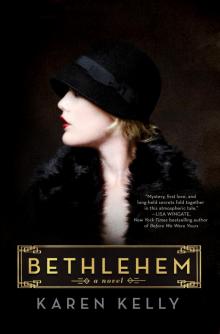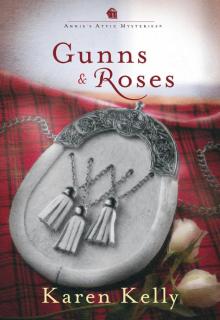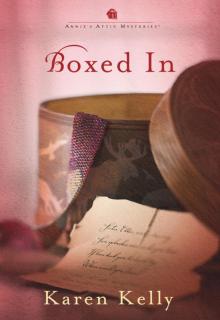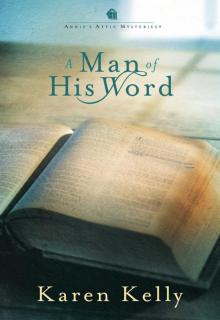- Home
- Karen Kelly
Bethlehem Page 14
Bethlehem Read online
Page 14
“Grandmother, look!”
He was balanced on the bronze rail of the orchestra platform, poised to launch himself forward in what would be a daring attempt at a flip. But at the very moment the women turned their heads, his foot slipped and he fell backward. Surreally, he seemed to hover in the air—all animation suspended. And then they watched helplessly as his body toppled in a twist, landing with a sickening crack and his right arm splayed at an impossible angle.
For a paralyzing moment he didn’t make a sound; but by the time Joanna reached his side, he had started to wail, and it wasn’t more than a second before Daisy joined him. It had been seven years since Joanna had worn a nurse’s uniform, but professional instincts trumped motherly panic as she bent over her son, blocking out the howls of pain as she moved him—as carefully as possible—off his arm. Cradling him on the floor, she cast around the room for Susannah, fully expecting to find her mother-in-law at her side. Charlie continued to moan and Daisy continued to shriek, but Susannah was nowhere near. Joanna finally saw her—backed against the wall, hand to her mouth, white as a sheet. There was a stunned, fractured look in her eyes. And then, with the strange, absent aspect of a somnambulist, she turned dumbly and walked out of the room.
Ten
OCTOBER 1924
“You smell like cherries … and a sunny day … and a good dream…” Chap was pressing his nose against Susannah’s neck, murmuring close to her ear. “And a perfect throw to first.”
Susannah laughed as his lips grazed her skin. “I’m wearing a new scent—it’s called Eau de Throw. I thought you would like it.”
“How do you know me so well?” He smiled—a contained, teasing twist that produced a slight crescent in his right cheek and a tingling in Susannah’s veins.
The sensation wasn’t new—in fact, it was becoming very familiar. Earlier, as she’d waited for him on a weathered wooden bench by the boathouse, the anticipation alone had caused a dizzying rush that made her wonder if she had a fever. And when she spotted him moving toward her on the rocky path—agile, masculine, indescribably desirable—she had the overwhelming sensation that her pulse was fighting to push out of her skin.
The boathouse was abandoned—it had been used by the local rowers’ club for several decades, but it now sat derelict and decaying, replaced by a new fieldstone building on the other side of the river. Despite the queasy association with Wyatt, it had become their regular meeting place by virtue of the fact that it provided complete privacy and—after Chap broke a small glass pane to unlatch the window—a roof over their heads. The amenities were somewhat less than luxurious—a wooden bench surrounding the room, a few decrepit oars, empty pegs on the walls, and a sooty wood stove in the corner. Also, the requisite evidence of squirrels, mice, and some very industrious spiders. But it was hidden and dry and—for the time being—theirs.
In the days following the party, Susannah had been lost in a muddled fog—drifting aimlessly through the house as the maids set things back in order, waving a distracted farewell as Kit and India packed up and left for their respective schools, and asking for a tray in her room when she realized conversational participation at the dinner table would now be compulsory. In the savory grip of fixation, she replayed the evening a thousand times.
Naturally, Chap had been placed at her right for the midnight supper. They’d sat beside each other in near complete silence, neither of them taking more than a bite of the turbot aux beurre blanc set before them. When the evening finally crawled to an end, Susannah stood with her parents at the door, thanking the guests with rote formality. Chap took leave with his father, waiting silently near the cloakroom while Charles bantered with Hollins about an upcoming golf game. In the prolonged awkwardness, another group of exiting guests brushed past, distracting the family with goodbyes. In that moment, Chap caught Susannah’s eye, and, again—with unfaltering certainty—affirmed what she already knew.
Her final year at Bishopthorpe began in buffered oblivion—instructors soundless, studies neglected, friends perplexed. And then, one damp and dreary September afternoon, she found herself walking in the wrong direction. Without conscious intent, she turned down Summit toward Brodhead Avenue, compelled by something like gravitational force toward the leafy, gothic environs of the Lehigh University campus.
From the moment she stepped onto the grounds, Susannah knew she would be conspicuous. Except for visitors, there were no women on campus. Beyond that, she was only too distinguishable to many of the men there. In a town the size of Bethlehem, Susannah would have been recognized had she been the daughter of the local wheelwright; but at Lehigh—where her father was on the board of trustees—anonymity was nothing more than a distant dream. The university had been established as an engineering school—a place to prepare the sons of Bethlehem to follow in their fathers’ footsteps at Bethlehem Steel. By association, Susannah was playing to a particularly discerning crowd.
And so it wasn’t unexpected when a group of young men on their way to class tipped their caps to her. She recognized three of them as classmates of Kit (and—more disquietingly—Chap). In fact, one of them was Gerald Barnwell, her frenetic Charleston partner.
“Well, hello there! Fancy seeing you here!” Gerald beamed as he stepped ahead of the pack, sweeping his arm out in presentation. “For those of you who don’t know it, this is Sassy Parrish—it was her party I was telling you about!” He gave Susannah his woodchuck grin, chest puffing a little with proprietary pride. “Just the other day I was saying what a smash it was!” Turning again to his chums, he reiterated what they had already heard several times. “She had the Wildecats.” He dropped the name with relish, basking in reflected glory. “They were the berries!” His enthusiasm continued to spill over as he elaborated every salient detail, finally winding down with the question Susannah had hoped to avoid. “So, what brings you to this lawless neck of the woods?”
With a bright smile, Susannah laid her hand on Gerald’s arm, sprinkling charm all over him through a bald-face lie. “Big game coming up!” Her enthusiasm was implicit as she nodded at the group. “My father sent me over to pick up the tickets—we wouldn’t miss it.” The Lehigh-Lafayette game was the longest-standing football rivalry in the country, and the Parrishes had, indeed, been attending since Susannah could remember. “I’m just on my way to the stadium—must dash.” She moved off with a cheery wave, calling back over her shoulder: “Fingers crossed for a pretty day and a big win!”
The stadium was on Taylor Street, so she headed in that direction, purposeful and intent; but at the first obscuring bend in the road, she made a quick, wary survey. Then, instead of turning left at the corner, she turned right.
The Lehigh campus, sprawled on the north face of South Mountain, was relatively level at the base, where the stadium and main academic buildings were situated. There were paved paths that crisscrossed the smooth lawns, leading to an impressive assortment of noble, Romanesque edifices; but to reach the resplendent Linderman Library or the towering grandeur of Packer Hall required an uphill climb. And past these, high on the hill, was the lofty domain of the university’s three fraternity houses.
Susannah had to stop to catch her breath as she made her way up a ruthless series of chipped stone steps. She passed a few more students hustling down the hill, but—to her relief—she recognized none of them. Finally, at the top of a particularly punishing incline, she came to a winding road. When she looked up, she could see the stately trio of fraternity row. The first building, a stone Georgian colonial with a colossal federal-style portico supported by soaring columns, was the Chi Psi house.
The dismal gray of the day worked in her favor—there wasn’t a soul in sight. Somewhere on the side of the hill, her blithe charade had been abandoned; it may have been the close heaviness in the air or the taxing exertion of the climb, but something had caused a clammy flush on her skin and a loud banging in her chest. In the solitary stillness, Susannah stood on the edge of the road and looked up at the ho
use, one hand grasping a steadying sapling, the other holding out her heart. And when the front door opened and a figure stepped out, she wasn’t at all surprised.
He paused on the front step for a moment, settling his eyes on her in calm avouchment; and then, slowly and deliberately, he descended the stairway and the canted front walk. When he reached her, he stood very close, his voice low and solemn. “A guy could grow old waiting for you.”
And then he smiled softly, and the clamor her in chest was instantly stilled, replaced with an ease essential and full.
But the house looming over them had eyes that lurked, and Chap threw a cautious glance over his shoulder. “Go up the road about forty yards or so. There’s a path on the left. If you follow it into the woods, you’ll see a lean-to where we keep firewood. Wait for me—I’ll be there in a minute.” His hand brushed hers—quick and covert—and he set off in the direction of Packer Hall.
The precaution would be the first of many; a winding trail of careful contrivances as they played for time, steeped in denial, desperate to elude the hovering specter that followed them everywhere, whispering Wyatt’s name.
But the potential hazards were boundless. Helen continued to extend regular dinner invitations to both Charles and Chap, insisting they fill the places vacated by Kit and India, and Wyatt as well. In every instance, Chap found a reason to decline, pleading studies and meetings and campus activities—but it was clear that Charles was becoming impatient with his son’s perpetual absence. It had started to smell unappreciative and heedless. Arriving alone on a recent Sunday, he shook his head as he handed his hat to Harriet, explaining that Chap’s attendance was required yet again at some university function or another.
However—as Susannah was to find that same evening—there was an unexpected advantage to the slippery jeopardy of the situation. Although she had known Chap for most of her life, the knowing had been peripheral, indirect. It was becoming more apparent with every hushed, revealing exchange that she hadn’t really known him at all. Her image of him as Kit’s perennial partner in crime; as Wyatt’s breezy, effortlessly charmed older brother; and as India’s moony obsession was proving shamefully shallow. Recently, Susannah had been surprised when—during a long, quiet conversation in their musty hideaway—he admitted a bleak ambivalence about studying engineering, and described the heavy, pressing weight of the shadow cast by his father’s genius. More enlightening still, she learned that he had taken every literature course available at the university, and that he sometimes wished he had followed his instincts to enroll in a liberal arts program. With a small, rueful laugh, he told her that in his heart he was an English major.
This admission was certified in black and white as Charles settled into his favorite wing chair for a pre-dinner cocktail that Sunday evening. As Hollins handed him a glass of whiskey, Charles patted the front of his jacket, and then pulled a slim, rolled-up magazine from the inside pocket. Smoothing it out, he offered it to Helen. “I thought you might like to see this.”
She accepted it quizzically—it was a literary quarterly called the Keystone Review. “Why, thank you, Charles. I’ll take that as a compliment.” Riffling the pages, she gave him a teasing smile. “A unique and thoughtful gift—I’ll have to invite you to dinner more often!”
He chuckled at the absurdity therein. “It arrived in the mail the other day. I thought it was odd that I should receive something like that—I’ve never been one for magazine subscriptions. But there was a letter included. It seemed my essay had been selected for publication.” He raised his brow. “You can imagine my surprise. It took me a minute to remember there was more than one Charles Collier at that address.” He nodded at the journal in Helen’s hands. “Turn to page seven.”
As Helen paged forward, Hollins squinted over. “Are you talking about Chap?”
Susannah was seated on the davenport, politely present and accounted for, doing her participatory duty … but she hadn’t exactly been participating. In fact, she was paging through her own magazine—the latest McCall’s—looking at the fashions and considering a new coat. But now she sat up straight and the McCall’s fell to the floor.
“Dear heavens, it is Chap!” Helen had found the page and was looking at the byline with eyes wide. “When did he become a writer?” Her voice echoed the astonishment on her face.
“That’s what I said.” Charles was shaking his head. “I made some inquiries—that little journal has quite an impressive pedigree. But it was odd … when I congratulated him on it, he wasn’t as pleased as I expected. I pointed out the fact that he might now—to an extent—be counted in the ranks of DuBois and Adams, but his response was … well … I guess you could say tepid.” He paused for a moment, and then his voice wavered slightly as his eyes focused on the pages. “I think the subject matter made him uncomfortable. It’s very … tender.” He cleared his throat. “I thought you, Hedy, would appreciate it. He agreed to let me keep this copy—I don’t think he would mind if you read it.”
Looking down at the page, Helen read aloud: “He Wanted to Build Her a Boat.” She drew a sharp breath. “Oh. Oh my.” She looked up at Charles. “It’s about Frances?” Everyone in the room knew the provenance of the title. It was a fond, teasing reference that Frances would on occasion make, illustrating the sweet devotion of her youngest son. As the story went, she was reading to Wyatt one evening—a children’s tale of a voyage at sea. As she turned the last page, she wistfully remarked how exciting and wonderful it would be to sail around the world. Gazing up at his mother with all the fervor that his heart could muster, the little boy solemnly promised that when he grew up he would build her a boat. He wanted nothing more in the world than to make her dreams come true.
Charles nodded. “Yes, about Frances … and Wyatt.” He took a sip of his drink and gave Helen a small, sad smile. “Don’t feel obliged to read it now. I think it would be best left for later.” And then he turned to Susannah, pausing for an extra beat before he spoke: “I thought you might appreciate it, as well.”
She could feel a hot flush on her cheeks. Appreciate it because of … the author? Or was he thinking of the subject? Naturally, she would have an interest in something about Wyatt.… Through a frozen smile, she stuttered a response: “I.… Yes. Of course. I would love to read it. Thank you.” She leaned down to retrieve the McCall’s, and in a stroke of excellent timing, Helen stood and suggested they go to the table.
* * *
It was nine o’clock before Susannah was alone in her room, curled up on the bed with the essay finally and firmly in hand. It had been the longest dinner she could ever remember. Charles had lingered past the port, clearly reluctant to head back to the lonely emptiness of his home on Seneca Street. When he finally made his way out into the night, Helen had taken the magazine into the library and settled into the wing chair in the corner with her ritual evening brew—a cup of peppermint tea. Susannah must have strolled by the door at least four times, making a ridiculous effort to seem purposeful and casual. At last she saw that her mother had removed her reading glasses and was holding them in her lap, atop the closed magazine. Her head was tipped back and her eyes closed, but in the lamplight Susannah could see a reflective shimmer on her face.
Raising her head, Helen noticed her daughter in the doorway. “If only Frances could see this.” She looked down at the journal. “It’s so lovely. I had no idea.…” Stifling a small gulp, she sighed. “The things we don’t know about the workings of the heart are fathomless.” She stood and moved toward Susannah, holding out the slender volume. “But I expect you know that. Good night, Sass. Enjoy the reading.”
Susannah just stared, openmouthed, as her mother moved away.
Thirty minutes later her own cheeks were wet as she gently closed the journal, running her hand absently over the cover. Again, she was struck by the breadth and depth of what she had never known about Chap. The essay was, as much as anything, a reverent tribute to Wyatt, in his devotion to their mother. It was authenti
c and unguarded, and what struck Susannah most was the generosity of Chap’s observant, abiding love, in its appreciation of the special bond between his mother and his brother. She wiped a tear away as the last lines echoed in her mind:
He never got to build her a boat, but he plies the water with all his might, skimming across the waves in his hero’s quest, following her dream in his way. And I know she is there—his constant coxswain—calling encouragement in the wind and laughing with the sheer joy of watching him soar.
Susanna closed her eyes as a wave of queasy remorse covered her like hot, sticky tar. For his entire life, Chap had loved Wyatt in the best way a brother could. She knew that whatever torment she felt was eclipsed exponentially by his own. But it was inescapable. To pretend that this … reality … didn’t exist would be unforgivably fraudulent. It was like a terrible accident had happened, and now the only choice was to try to live with the damage and go forward.
But—like the victim of a real fatality—Wyatt didn’t know it had happened. Susannah looked across the room at a pile of letters, nearly overflowing from the small basket next to her writing table. They had arrived in a steady stream, stacked on a silver tray with the other correspondence of the day. She had come to dread the presentation of the mail tray, and her mother’s chirpy announcement that there was “yet another one for you, dear.”
The first one had come just days after the party. He had written to ask how it had gone.
Did Chap behave himself? I have to laugh when I picture him trying to match you on the dance floor. He really didn’t know what he was in for. I’ll bet you showed him a thing or two.
The next one was almost as wrenching.
We’ve been training hard. I’m lifting weights these days—I bet I could press you over my head. If you see my brother, tell him I want an arm wrestling rematch when I get home. Last time I had a sore wrist—he won’t be able to take advantage of me now.

 Bethlehem
Bethlehem Gunns & Roses
Gunns & Roses Boxed In
Boxed In A Man of His Word
A Man of His Word